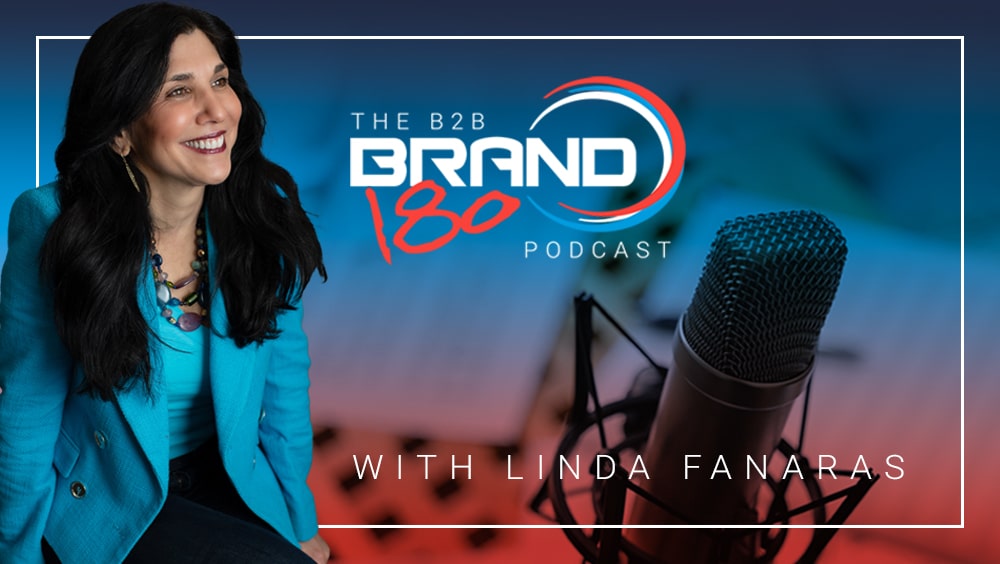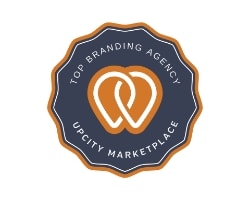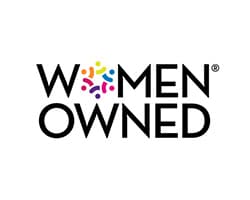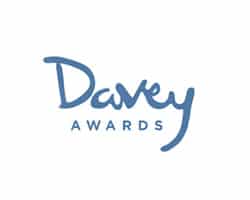In this episode of the B2B Brand180 podcast, Linda speaks with Mike Thorne, Author and Growth Mentor who specializes in transformational leadership, about building your leadership brand.
They discuss the impact of trusted communities and cultures of inclusion, how to connect a personal mission to an organizational mission, the importance of developing trust and the value of asking for help. They also talk about Mike’s book, Hustle with Heart, unlocking Self-Worth Through Personal Trust Communities.
You can learn more about Mike at the following links:
https://www.linkedin.com/in/michaelbthorne/
https://mikethorne.co
https://www.amazon.com/Hustle-Heart-Unlocking-Self-Worth-Communities/dp/1958729698
Thanks for listening to the B2B BRAND180 Strategy podcast with Linda Fanaras, CEO/Strategist at Millennium Agency.
Linda Fanaras:
If you want to transform your B2B marketing into a powerhouse brand, then you may want to listen in. And if you like what you heard today, click like, share, or subscribe. Hi, I’m Linda Fanaras, CEO of Millennium Agency, and I’m your host today and excited to bring Mike Thorne, who specializes in facilitating transformations in leaders, and he accomplishes this by helping them create trusted communities and cultures of inclusion. And these communities and cultures help people feel inspired, increase their engagement, and improve their actual organizational performance on every level. And to add to it, Mike released a book called “Hustle With Heart: Unlocking Self-Worth Through Personal Trust Communities,” which we will also talk about today. So, let’s get to it. Hi Mike, welcome to the B2B Brand 180 podcast. Thanks for joining me today.
Mike Thorne:
Oh, thank you for having me, Linda. I’m excited to have some time to talk to you and your audience.
Linda Fanaras:
So, I’m looking forward to hearing a little bit about your business, some marketing insights and knowledge and how you actually do transform leaders. Why don’t I have you do a quick introduction, Mike. Tell us a little bit about yourself and what you do.
Mike Thorne:
Sure. When I was nine years old, we lived in Sturbridge, Massachusetts, about an hour west of Boston, and my parents took me downstairs to our family room – the typical New England family room with the wood panels, the wood stove, the TV that doesn’t work very well, that has the tin foil to make sure you get channel 38 to watch the sports teams – and they sat me down and they looked at each other first, looked at me, and said, “Michael, we wanted you to know that you’re adopted and we love you very much.” And from that moment forward, it just shook my view of self-worth, and my view of what a family was, and it really catapulted me through my life, both personally and professionally in terms of always worrying about being abandoned and not trusting easily. And I think that has informed me in my business career in many ways. On the personal side, my wife and I have been married over 32 years. She’s my best friend. We’ve got three daughters, 31, 29, and 27. And as I went through my career, I started business and sales – business development sales – but it moved into the next phase, which was running businesses and the majority of them, if not all of them, were businesses that were mature, sort of stagnated business or looking for reimagination, some sort of transformation. So, I was brought in as the person to help rethink them. And the thing that I uncovered early on in my career, and I think it’s because of my own lived experience, is that the P&L that everybody worries about, the “profit and loss,” as critical as that is, the P&L that really matters is “people and listening.” And that was the gift that I had, the gift that I brought, and I’ve been learning that over the last 20 years of how to do it well, because that elevates the business and that’s where the work I do – transforming human beings and leaders.
Linda Fanaras:
Thank you for being so open about your story. I think that probably resonates with much of the audience. So, you had created a – wrote a book, basically, “Hustle With Heart: Unlocking Self-Worth Through Personal Trust Communities.” Taking a look at the books that you’ve written, maybe one over the other, “Hustle With Heart,” can you tell us a little bit about that book and how, how maybe the audience can find value with that particular story that you have?
Mike Thorne:
Yeah, first and foremost, it was expensive therapy. I’ll just leave… no I- the feedback I’ve gotten so far, the book’s only about three or four months, is that people assume because of looking, you could look at LinkedIn, just like people look at social media and you say, wow, this person’s just really successful. I could never do that. What they uncovered in reading it was that everybody’s challenged and has ups and downs in their life. And I have a process I put in the beginning, because I really believe everyone goes through this “Belonging, Building and Believing” phase and every transformation they make in life from elementary school, middle school, high school, college- I mean, you think about your own life. Every time you go into these new environments, you always ask yourself, “Do I belong?” And you have to build confidence. Then you have to believe you actually can be successful. I’ve even seen it within the Vistage work I do with CEOs who have run companies. They still, for the first time come into the environment and ask themselves, “Do I belong?” So, for anybody who’s out there thinking that it’s all these successful people have a straight line, and you think there’s no way I can do that. If you read the book, I think you’ll uncover many areas of my life where I fell down off the horse and had to get back up and reimagine how to go forward. So, I think those are the kind of people that might get value out of the book.
Linda Fanaras:
Okay. No, that sounds great. And I think, being an entrepreneur, you do, you have your successes and your failures, and I’m a firm believer that if you really do want to be an entrepreneur and a successful one, you have to be very persistent and determined and focused on your end goal. And I think, the title, “Hustle with Heart” really makes it seem like it’s, it’s about really following your heart, following what you believe in, and doing it with maybe a kind soul and some, or some, you know, or in some orderly fashion. What are some of the tips that are in that book that you think would help our audience today?
Mike Thorne:
Well, I think the first one is that we spend time, whether you’re an entrepreneur running a business or running a division of a company, or you have a group of people that work for you, I think the first thing is you have to really understand yourself. And so, the biggest message I would have out of this for the book and for the audience here, is just ask yourself, “Do I really know myself? Do I understand myself?” Too many times we’re building a business as an entrepreneur and we start getting two-thirds up the mountain, and then we try, run into all this, you know, whether it’s, whether it’s, uh, turbulence is probably the best word for whether it’s personal or professional turbulence. And when you’re ever that far up and you’re trying to resolve everything, there’s too much going on. You can’t think clearly. And so, I think you had to go back down the mountain and, and spend some time saying, “Who am I? What am I all about?” And some of you may say, “Oh, that’s the soft side of stuff. I don’t have time for all that stuff.” I’m telling you, the soft stuff is the hard stuff, and it’s going to help you grow through the things you’re going through when you do that. So, I just say, get back down the mountain and reconcile for who you are. And that’s what I had to go do. I was 40 years old. I was president of Russ Athletic, the pinnacle of my career as an athlete while I’m running the sports company. I was fired 15 months into the job and I thought, “Wow, what did I do wrong? I had all this great success.” Everything went really well, and I couldn’t accept the fact that I played a role in that. And so, for me, I had to go back down that mountain myself and start over again. And what I uncovered was a lot of painful truths. But from that point, now I’m 58. It really helped me understand how to go forward, leading people and leading a business and also a purposeful life going forward. And so, I think if you read this you’ll start to see elements of yourself, is what people have told me in there. And then it’s the question, “What are you gonna do about it?”
Linda Fanaras:
Yeah. And I think, um, what you’re saying makes complete sense when you run into struggles, you do have to look in the mirror sometimes and say, okay, like, “Where did I go wrong in this?” Or, you know, “What exactly happened and how can I change this next time for the better?” How do you expect somebody to go about that process? I mean, I think it, for a person, it requires a mature person to be able to take on that perspective and do some self-evaluation and determine what areas they should change. So how do you have a process that you would recommend?
Mike Thorne:
Yeah, there’s a workbook on my website that takes people through it, although I would say 80% of the people still want you to help them through it. But yes, there is. So, first and foremost is you’re spending time just assessing where you are personally, professionally, and health-wise, just doing a real assessment. For some people that’s taken a walk, taking notes, get a napkin out, whatever it is, take a rest. Everybody has their own way of sort of pausing. And I think once you sort of get, where am I personally, professionally and health-wise, on one side of the piece of paper, and then you go to the other side of the piece of paper and you just draw a box and say, “What is my North Star?” Like, what is it you really want to be? What are you trying to create for yourself? And I always say to people, you know you’re there when it is extremely exciting, but it scares the bejesus out of you, but it’s not, it’s not, uh, dangerous. You get that feeling in your stomach and say that’s what it is, but you’re so afraid to say it out loud. That’s the scary thing, but that’s where you really want to get to. When you create those two, where you are and where you want to get to, the concept of this personal trust community is there’s going to have to be people to help you get there. And I liken it to your wellbeing. And so, it’s, you know, who’s going to help you physically, because everyone knows the importance of being physically active. Intellectually, who are those people in your life or podcasts or books to keep you intellectually stimulated, emotionally, spiritually and socially? So, for example, I have someone who, Tim Dixon is a mental skills coach. He also played baseball at a high level. And Tim and I, whenever I’m having a rough go of it, I know emotionally, Tim’s the one person I can reach out to, and these people in this trust community are not people that judge you, so they may not be the people you might think of at first. These are the people that I would describe, they drop everything for you, even though you don’t see them doing it. They’re physically on the other end, dropping and saying, “Thorne needs help. Let me look at my calendar. When can we get together?” And you have these conversations with these people, and they’re there to support you, not judge you. And so, think of it like a trampoline, and these people are holding up the trampoline. You’re in the middle and you’re having a bad day. You’re heading off the edge and it can get dangerous. They just shift, and I know you can’t see this cause it’s just a verbal conversation, but the trampoline is moving, and these people move it all the time to keep you centered and support you, but they hold you accountable. It’s not just cheering you on. They hold you accountable. They’re moving with you, and that workbook will take you through that process of how to go do that with questions, to ask yourself to help navigate it. And clearly if you don’t feel comforting yourself, I’m happy to help people through it.
Linda Fanaras:
That’s, that’s fantastic. I know they say that it’s important to surround yourself with the people that you aspire to be like, at least the top five people you know, who do you look up to? You know, who brings positivity in your life, who supports you, and who makes you a better person and helps elevate you as an individual and a professional. So, that’s a great point. So, you call on him for guidance, it sounds like. Critical conversations, how do individuals determine who they should go to, who they should have those critical conversations with, and the process that may bring?
Mike Thorne:
So first and foremost, I did a Ted talk on this, and it was amazing to me what I learned, and that is the three most powerful words in life, besides I love you, are: “I need help.” And the majority of people are afraid to ask for help. And so, the first step is once you’ve identified, you know, kind of where you’re at and where you’re sitting, and then where you want to get to, you got to be clear because there’s nothing more frustrating than calling people and asking for help, and you’re all over the place. If you’ve ever experienced that, you can relate to it. So, get real clear, which means you got to wrestle that to the ground and get clarity with it. And then the first step is to think about people in your life that either you have a very close relationship with or someone you would like to. So, I’ll give an example. I have a, one of my, a CEO of mine, we were having this exact conversation. He was having a big issue in his business on something he wanted to launch, and he was not taking action on it. So, I went to this exercise with him and he said, “I know exactly who I should be calling. He’s my best friend from college. I’ve known him 40 years. We go out to dinner, we have drinks together, we laugh, share family stories, but I never ask him for help.” And I said, “Why is that?” And he said, “I’m afraid if I do, he is going to think less of me.” So again, people struggle with this self-worth. Despite all this success, this guy’s running a very successful company for many years. But he said, he’s the guy that could help me very much. He said, “How do I do it?” And I said, “Look, all you do is you pick up the phone, say, you know, ‘Bill, I could use some help. I need some help.'” And just walk them through what you’re trying to do. And the statistics will tell you that it’s a very, very high likelihood, almost 70% of the people are more than likely to help you because it energizes and lifts them up because they’re helping others. Where the majority of people think just the opposite, they’re gonna get ridiculed, they’re not going to have time for them. And so, they have this fearful perception of what’s really going to happen when in reality the opposite happens. And once you unlock that, that person’s there for you forever and you’re there for them. And that goes across all those, I call them pies, your physical, intellectual, emotional, social, and spiritual connections.
Linda Fanaras:
That’s great. Today there are so many emerging leaders coming up the ranks, young professionals, and there’s a mix of baby boomers and everybody in between. And I think it creates a generational gap between senior leaders and the organization. So how do you envision, individuals actually addressing the culture, making sure that it’s an open and transparent and communicative culture that actually moves the ball forward.
Mike Thorne:
Now that’s a great question. It’s a wrestling match. You look at all the efforts, especially coming through COVID, it was all around “We gotta build trust. We need diversity, inclusion and equity work.” And all- and then nothing transpires. And I believe it’s because the people are asking to go do that, the people in leadership positions, young, middle-aged or mature, I’ll call them, they have not wrestled themselves to the ground, so they’re typically going to go just gravitate to what they know versus actually implementing something. So, I go back, it’s just going back to- I’m making sure you’re clear with who you are and what values you have and what matters to you. If you, if you’re comfortable with that and you can be genuine about it, people will pick up on that and the way you go about building trust, this is my experience and I struggle with it because of my own abandonment issues, until I finally realized if you just meet people where they are and ask these things like, “Tell me your story.” If you don’t know these people very well, “Just tell me your story.” Because I believe the better you understand people, the more apt you will be able to work with them and help them. And we don’t spend time as leaders doing that. So, if you’re a young leader and you’re thinking about growing your business and you’re worried about all the profit loss, which is very important, making payroll and all that, you should. But if you want to be an outstanding leader and you want to lead, lead from a way of helping others and in support of others, you gotta really start to ask yourself, how well do I know the people that are working for me and how well do I understand what they’re going through? Because people are going through an awful lot. The second thing, people spend time at work today, besides doing their job, is hiding. A statistic. They’re hiding. And they’re hiding because they don’t believe they belong. They don’t know if they can do the work you’re asking them to go do. They’re not clear on what exactly they’re supposed to do. And just think about the lack of, uh, capacity you’re losing by not understanding that. So, I would go spend a lot of time just getting to know your people at a deeper level, but you gotta get yourself straightened out first. Otherwise, it’ll be disingenuous when you do.
Linda Fanaras:
Right, and I think leaders who are going to sort of engage in this, especially with the hybrid workforce today, it’s important that leaders do develop some sort of persona around them so they can brand themselves as a leader. So, whether it’s an empathetic leader or a diplomatic leader or whatever the case may be or what, what do they like? And I think it’s important to take a look at that in order to have some sort of a personal brand around someone’s leadership skills. Would you, do you have any comments on that?
Mike Thorne:
Yeah. Do you think about, I don’t know if you’ve ever heard the saying, “The cobbler’s children have no shoes?” But- so you think about marketing, which is what you do all this work around, and we spend a lot of time, “Who’s your consumer? What’s the avatar? What’s the sales journey your consumer takes?” All this work we’re doing on behalf of who our, you know, outwardly consumer is, which obviously drives our business. It’s the same kind of dialogue you need to have with yourself and your employees that people just don’t do. We spend time trying to hire new people, which is a big- it’s a difficult challenge that I just ask people: “How much are you spending time ensuring you’re getting full capacity with people that work for you?”
Linda Fanaras:
Yep. No, that’s fantastic. Now, one of the points I wanted to make is when you’re building out these personal trust communities, you know, you talk about how life is a team sport, and I do like the concept, obviously you hear that every single day, but I do know that people, many people like to work solely alone, and they’re not that interested in a team sport. You always have those people who want to play individual sports versus team sports. How do you address that? How does, how does everybody actually achieve that?
Mike Thorne:
Yeah. So that statement of life as a team sport may not mean you’re actually on a team. So, for example, I was training for a half Ironman, which I thought, “My God, how am I gonna do this?” And I found a lady in New Hampshire, and she is highly skilled at this, and she became, so I’m training on my own. I was living by myself. I didn’t wanna be on a team. There were certainly teams I could have joined that do this stuff, like triathlon groups and all that. I wanna do it myself. So, to answer your question, there are times you’re gonna do that, but I still need somebody who has the expertise to make sure I’m doing all the right things and growing as I go through this journey. So, I think that’s another way to think about this idea of life as a team sport. And that is, if you’re working on your own or whatever, there’s still people in your life that need to keep you elevated. I, I don’t know how anybody can humanly go through their life by themselves and maximize their life experience and get joy out of it.
Linda Fanaras:
And I think every opportunity is a learning opportunity, so I think if people can look at, whether professionally or personally to, you know, take advantage of that thought process. So, are there any other key points you’d like to talk about regarding your books, either “Hustle with Heart” or “Unlocking Self-Worth?”
Mike Thorne:
I think the only thing, just to connect the dots, because I know the audience in here is, you know, small business and entrepreneurs and we’re trying to help them. This is the connection of this North Star, your personal North Star. For those of you that may be wrestling, it’s no different than in your organization. Because you’re an organization, you’re trying to find what is, what is your differentiating point? I’ve listened to some of the podcasts on here, and you talk a lot about how companies have to really understand who they are, what the white space is, how they differentiate themselves. It’s no different from us as humans. And I had somebody years ago say to me, “Mike, you need to stop trying to boil the ocean.” And I was trying to do so many things just like a business is. And I’ve heard you talk about this. You know, you try to be everything to everybody because we can do it all. And his point to me was, “No, find your white space, find your niche and just swim in it.” And when you do that, I think, I believe once you declare where you’re going in life, people just start showing up. And we’re also afraid. So, I would say if you’re connecting your personal trust community and your North Star with your business, it’s the same journey, it’s just that it’s you versus your company. But they’re interconnected. I think this idea of, uh, there’s a work and life balance, I think is BS. I think it’s about harmony. So, I would just have spent people spend a lot of time connecting what they do in their business with their own personal- and they probably will understand how to go at this very well. But again, the workbook is there if they need it as a support system.
Linda Fanaras:
Yeah, I, no, no. And I do, I really like that a lot because if you think about as a leader, you have, frankly, a reputation and you have a persona and you want to leverage that, but it needs to be authentic. So, the more authentic it is, the more effective you will be as a leader and that completely makes sense to me. So that’s fantastic. Well, I do, I appreciate everything that you provided today. It was great insight. So let me take a minute right now and thank Mike Thorne, author of “Hustle With Heart: Unlocking Self-Worth Through Personal Trust Communities,” for all your insights on leadership and building communities and having those real conversations. I think it’s really important to have real conversations that are authentic and true and thank you so much for joining us today on Brand 180 podcast. And if you like what you heard, press like, share, or subscribe today.
Mike Thorne:
Thank you very much for having me.





























